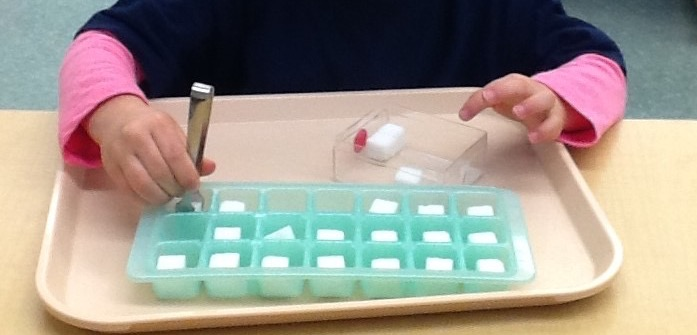
It’s a sort of curious activity to watch: a young child, mesmerized, repeatedly transferring some small object from one container to another and back again. Maybe the containers are filled with pom poms or small rubber pellets. Maybe the tongs are large and wooden or maybe they’re tiny tweezers. But the child is absorbed, intent on her work, just moving the items back and forth and back again.
There’s no magic in the material, nothing about it that changes the nature of children’s development. Quite the opposite: because of what we understand about children’s development, we know this material will enchant them, engaging them in deep concentration for far longer than an adult might expect a simple transferring activity could do. We appreciate that young children are intrinsically motivated to develop their motor skills, to touch and move and act upon their environment. We know that they are intrinsically motivated to develop their precision, that they have a strong internal drive to order and that they want to exert some control on their environment, even in small ways. Transferring small objects with tongs responds to each of those drives. Here is a small sample of the world, through which children can develop their motor skills, grow in their precision, and observe a beauty and order in their work. The repeated activity settles the child and allows for a kind of mindful practice that builds concentration and attention. The left to right sequencing of the material supports the development of cognitive habits consistent with the structures of the English language. The fingers used by the tongs are the same ones that will ultimately hold a pencil, making handwriting that much easier when the child is ready to form letters.
Tonging is one of those exercises that seems contrary to so much our cultures tells us about what motivates children. There are no loud bells or whistles. There are no electronic screens or touchpads. There are no gold stars when you get the work, “right.” But the deep concentration and contentment on the children’s faces remind us that their needs are often far simpler and easier to meet: a quiet space, a challenging task, and as much time as they choose to satisfy their drive. Not bad for a pair of little cups and some sparkly pom poms.
#PracticalLife #Writing #Curriculum #Infants #Toddlers #FirstPlane #Primary #ForParents #ForTeachers
